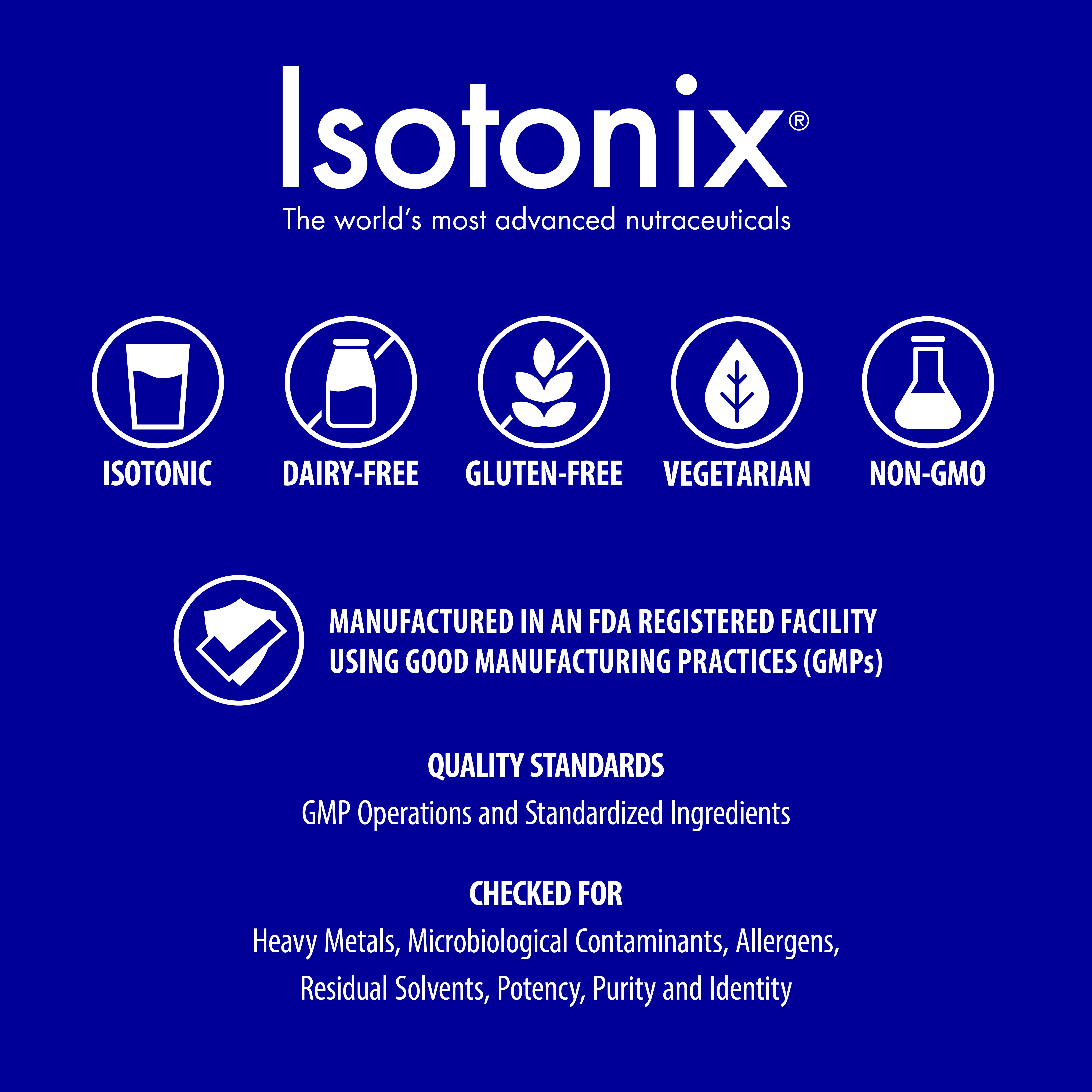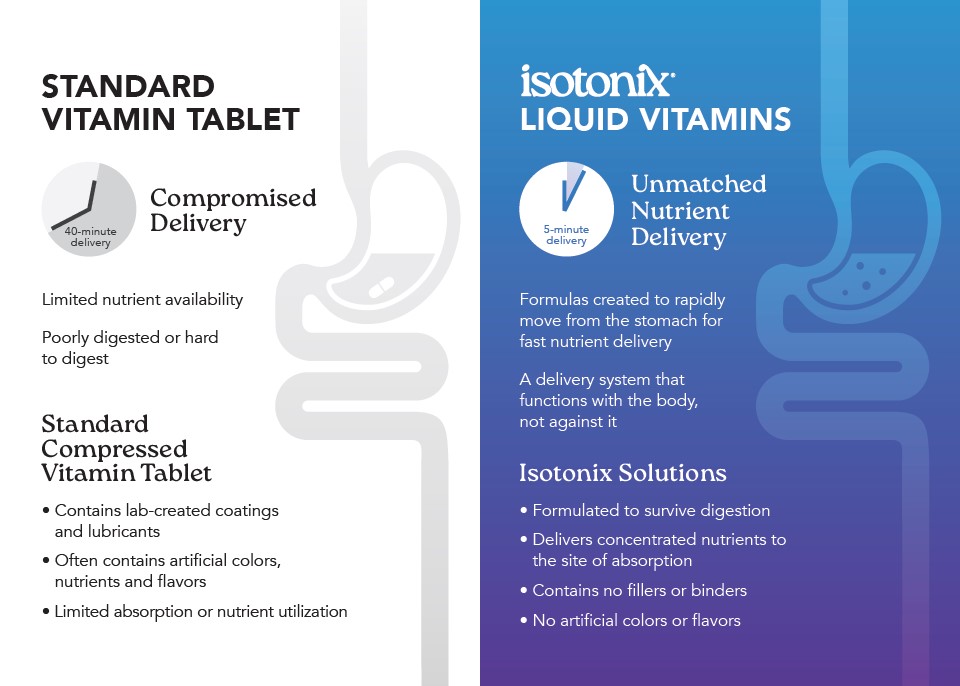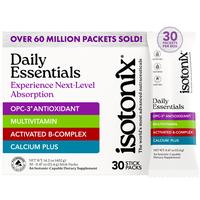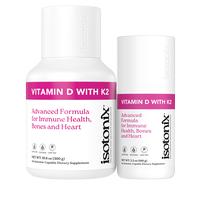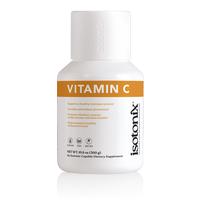Discover a new you with a healthy lifestyle change
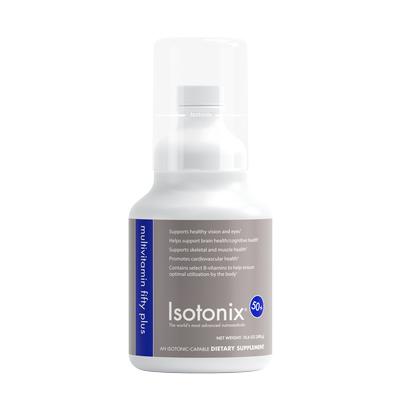
Isotonix® Multivitamin Fifty Plus
sku 13076
$49.95
$ 1.00 Cashback
This product qualifies for free or reduced cost shipping. Learn More
Primary Benefits* of Isotonix® Multivitamin Fifty Plus
Embrace your age.
- Helps promote normal levels of vitamins and minerals in aging men and women
- Provides nutrients essential for numerous processes in the body
- Contains activated forms of select B-vitamins to help ensure optimal utilization by the body
- B Vitamins are essential for many key functions in the body
- Vitamins B1, B2, B3, and biotin participate in different aspects of energy production
- Vitamin B5 is involved in the Kreb’s cycle of energy production and is needed to make the neurotransmitter acetylcholine. B5 is also essential in producing, transporting, and releasing energy from fats
- Vitamin B6 is essential for amino acid metabolism
- Vitamin B12 and folate facilitate steps required for cell division
- Folate helps form building blocks of DNA, the body’s genetic information, and building blocks of RNA, needed for protein synthesis in all cells.
- Aids in red blood cell formation
- Involved in the metabolism of proteins, fats, and carbohydrates
- Necessary for proper functioning of the nervous system, bone marrow and intestinal tract (B-vitamin deficiencies appear in these tissues first)
- Helps support brain health/cognitive health
- Helps maintain normal production of neurotransmitters
- Promotes a healthy nervous system
- Supports a healthy heart
- Promotes cardiovascular health
- Supports healthy vision and eyes
- Supports healthy immune functions
- Supports skeletal and muscle health
- Supports healthy teeth and gums
- Provides a strong antioxidant defense
What Makes Isotonix Multivitamin Fifty Plus Unique?
Adequate nutrition during the golden years has its challenges. As we age our bodies become less efficient at absorbing crucial nutrients, so it's important to be sure we’re getting the right vitamins and minerals. A good way to make sure you get all the nutrients you need is by taking a daily multivitamin supplement. Although a healthy diet is crucial to getting the nutrients your body needs, as we mature we often experience smaller appetites, loss of taste, dietary restrictions due to medical problems and stress can still impact our food choices and food quality, which can impede us from achieving our optimal nutrient intake via food alone. People over 50 should take special care that they are getting enough B12 – found naturally in meats, fish, eggs and dairy products, along with folate – found in animal products and leafy vegetables. These are nutrients that the body absorbs less of as you get older. Getting enough B12 and folate supports the formation of red blood cells and promotes healthy nerve function. Adequate intake of B12 and folate can also support liver, heart and cognitive health.*
Vitamin C is an antioxidant, and wards off free radicals. Getting enough vitamin C is especially important as you get older because it supports immune health. Vitamin C supports healthy cholesterol levels in the blood and fights free radicals to support heathy eyes as we mature.* Calcium and vitamin D are also critical nutrients to take in as you age, to help maintain bone strength; especially in women. In addition to needing added vitamins, aging adults need added minerals as well. Along with calcium, your aging body needs magnesium, chromium, potassium, zinc and many more to help you maintain good health.* Making sure you get the proper nutrients may not turn back the clock, but it can help keep it wound up. Isotonix® Multivitamin Fifty Plus is an isotonic-capable food supplement that has been specially formulated with a broad spectrum of nutrients that help support the health of adults 50+ and help keep your clock ticking efficiently. Isotonix Multivitamin Fifty Plus supplements dietary deficiencies and helps maintain normal metabolic functioning, essential to keeping you healthy as you age. *
Only Isotonix Multivitamin Fifty Plus contains a unique blend of complimentary vitamins and minerals with the superior delivery of Isotonix, which makes them easier to take for aging adults. Isotonix dietary supplements are a replica of the body’s own fluids such as tears, sweat and plasma. The body’s common osmotic pressure allows a consistent maintenance of body tissues. Isotonix Multivitamin Fifty Plus is readily available to our bodies due to its isotonic state.*
*These statements have not been evaluated by the Food and Drug Administration. This product(s) is not intended to diagnose, treat, cure or prevent any disease.
ØQuatrefolic® is the registered trademark of Gnosis S.p.A. and is protected by the U.S. Patent No. 7,947,662.
Product Classifications
Vegetarian - This product is vegetarian
Gluten-free - The finished product contains no detectable gluten (<10 ppm gluten)
Isotonic-Capable Drinkable Supplements - Easy-to-swallow supplements in liquid form are immediately available to the body for absorption
No detectable GMOs -- The finished product contains no detectable genetically modified organisms
Quality Standards - GMP Operations and Standardized Ingredients
Checked For: Heavy Metals, Microbiological Contaminants, Allergens, Residual Solvents, Potency, Purity and Identity
Isotonix Delivery System
Isotonix - the World's Most Advanced Nutraceuticals
Isotonic, which means “same pressure,” bears the same chemical resemblance of the body’s blood, plasma and tears. All fluids in the body have a certain concentration, referred to as osmotic pressure. The body’s common osmotic pressure, which is isotonic, allows a consistent maintenance of body tissues. In order for a substance to be absorbed and used in the body’s metabolism, it must be transported in an isotonic state.
Isotonix dietary supplements are delivered in an isotonic solution. This means that the body has less work to do in obtaining maximum absorption. The isotonic state of the suspension allows nutrients to pass directly into the small intestine and be rapidly absorbed into the bloodstream. With Isotonix products, little nutritive value is lost, making the absorption of nutrients highly efficient while delivering maximum results.
Key Ingredients
Vitamin A is a fat-soluble vitamin. Sources of vitamin A include organ meats (such as liver and kidney), egg yolks, butter, carrot juice, squash, sweet potatoes, spinach, peaches, fortified dairy products and cod liver oil. Vitamin A is also part of a family of compounds including retinol, retinal and beta-carotene. Beta-carotene, also known as pro-vitamin A, can be converted into vitamin A when additional levels are required. All of the body’s tissues need Vitamin A to support normal growth and repair. Vitamin A helps to promote healthy vision, normal bone growth and supports an antioxidant defense and a healthy immune system. Taking beta-carotene by mouth along with vitamin C, vitamin E, and zinc daily, seems to support eye health.*
Vitamin B1 (Thiamin)
Vitamin B1 is a water-soluble vitamin that promotes normal processing of carbohydrates, fat and protein. Every cell of the body requires vitamin B1 to form the fuel the body runs on, adenosine triphosphate (ATP). Vitamin B1 promotes normal functioning of nerve cells and supports carbohydrate metabolism. B1 helps maintain a healthy nervous system by supporting the normal production of the neurotransmitters acetylcholine and gamma-aminobutyric acid (GABA).
Riboflavin (Vitamin B2)
Vitamin B2 is a water-soluble vitamin that promotes the normal processing of amino acids and fats, activation of vitamin B6 and folate, and supports the conversion of carbohydrates into the fuel the body runs on, adenosine triphosphate (ATP). It also promotes healthy red blood cell formation, supports the nervous system, respiration, antibody production and normal human growth.
Niacinamide
Niacin, also known as vitamin B3, supports energy production in the body. It works with vitamin B1 and vitamin B2 to support the release of energy from carbohydrates. Similar to vitamin B6 and folate, niacin helps support the body's normal renewal of tissues.
Vitamin B6 (pyridoxal-5-phosphate)
Pyridoxal-5-phosphate is the active form of vitamin B6. Poultry, fish, whole grains and bananas are the main dietary sources of vitamin B6. Vitamin B6 supports numerous metabolic pathways in the body and is a co-factor required for protein and amino acid metabolism as well as helps maintain proper fluid balance. P5P supports the normal synthesis of neurotransmitters in the brain and peripheral nerve cells. It has been recommended as a nutrient to support mood, and it supports normal nerve conduction. Vitamin B6 also promotes the normal production of glutathione, which is essential for detoxification.* Vitamin B6 supports the maintenance of healthy red and white blood cells and hemoglobin synthesis. Vitamin B6, when taken with folate, has been shown to support cardiovascular health. Vitamin B6 should be administered as a part of a complex of other B-vitamins for best results.
Pantothenic acid (Vitamin B5)
Pantothenic acid, also called vitamin B5, is a water-soluble vitamin involved in energy production and the formation of the neurotransmitter acetylcholine, which supports brain health. Pantothenic acid works together with vitamin B1, vitamin B2, and vitamin B3 to make the fuel our body runs on, ATP. It also promotes the normal production, transport, and release of energy from fats. Pantothenic acid promotes the normal secretion of hormones.
Vitamin B12 (Methylcobalamin)
Vitamin B12 (cobalamin) is naturally found in animal products, especially organ meats such as liver, with small amounts derived from peanuts and fermented soy products, such as miso and tempeh. It is essential that vegetarians consume a vitamin B12 supplement to maintain optimal health. Vitamin B12, when ingested, is stored in the liver and other tissues for later use. It supports the maintenance of cells, especially those of the nervous system, bone marrow and intestinal tract. Vitamin B12 is important in homocysteine metabolism (homocysteine is an amino acid that is formed within the body). Normal homocysteine levels are important for maintaining cardiovascular health. Folate and B12, in their active coenzyme form, help to maintain healthy blood levels of homocysteine. Methylcobalamin is one of the naturally occurring forms of vitamin B12 found in the human body. The liver must convert cyanocobalamin, the form of B12 most commonly used in supplements, into methylcobalamin before it can be properly utilized by the body; methylcobalamin is more effective than non-active forms of vitamin B12. Methylcobalamin also assists in the formation of SAMe (S-adenosylmethionine), a nutrient that positively impacts mood. B12 also promotes normal conversion of sulfur-containing compounds to glutathione, a powerful antioxidant in the body, thus B12 provides strong antioxidant defense and combats free radicals.
Folate [as (6S)-5-methyltetrahydrofolate calcium)]
Folate is mainly found in fruits and vegetables. Dark, leafy greens, oranges, orange juice, beans, peas and Brewer’s yeast are the best sources. Folate boosts the benefits of B12 supplementation. These two B vitamins join forces and work together to help maintain normal red blood cells. Folate assists in the normal utilization of amino acids and proteins, as well as supporting the construction of the material for DNA and RNA synthesis, which is necessary for all bodily functions. Scientific studies have found that when working in tandem with folate, B12 is capable of promoting normal homocysteine levels. This works toward supporting a healthy cardiovascular and nervous system. Glucosamine salt of (6S)-5-methyltetrahydrofolate, the most active form of folate, as it is structurally analogous to the reduced and active form of folate. Because this form is naturally present in the body, it is much more bioavailable for its biological action without having to be metabolized in the body.
Biotin
Biotin, a water-soluble B-vitamin, acts as a coenzyme to support the normal metabolism of protein, fats, and carbohydrates. Biotin can be found in food sources such as egg yolks, peanuts, beef liver, milk, cereals, almonds and Brewer’s yeast. Biotin promotes healthy cell growth, the production of fatty acids, metabolism of fats and amino acids. It supports the citric acid cycle, which is the process in which energy is generated during exercise. Biotin is also helpful in maintaining steady blood sugar levels, and is often recommended to support strong hair and nails.Biotin also supports various metabolic chemical conversions. Aging adults get the energy they need from food through metabolism - the chemical reactions in the body's cells that convert the fuel from food into the energy needed to do everything from moving to thinking.
Vitamin C
Vitamin C, also known as ascorbic acid, is a water-soluble vitamin that has a number of biological functions. Vitamin C is found in peppers (sweet, green, red, hot red and green chili), citrus fruits and brussel sprouts, cauliflower, cabbage, kale, collards, mustard greens, broccoli, spinach, guava, kiwi fruit, currants and strawberries. Nuts and grains contain small amounts of vitamin C. It is important to note that cooking destroys vitamin C activity. Vitamin C supports normal tissue repair and healing. It is also a cofactor for dopamine production. Vitamin C is integral in supporting a healthy immune system, promoting cardiovascular health, helping to maintain healthy cholesterol levels and providing an antioxidant defense. The body does not manufacture vitamin C on its own, nor does it store it. Therefore, Vitamin C must be acquired through diet and supplementation.
Vitamin D3 (Cholecalciferol)
Regular sunlight exposure is the main way that most humans get their vitamin D. Food sources of vitamin D are vitamin D-fortified milk (100 IU per cup), cod liver oil, and fatty fish such as salmon. Small amounts are found in egg yolks and liver. Vitamin D promotes the absorption of calcium and phosphorus and supports the production of several proteins involved in calcium absorption and storage. Vitamin D works with calcium to promote hard, strong bones. It works to promote active transport of calcium out of the osteoblasts into the extra-cellular fluid and in the kidneys, promotes calcium and phosphate uptake by renal tubules. Vitamin D also promotes the normal absorption of dietary calcium and phosphate uptake by the intestinal epithelium. It promotes healthy growth and repair of tissues, and supports overall skin health.* Vitamin D promotes proper brain function, and is also helpful in promoting normal glutathione levels which assist in detoxification of the body. In addition to supporting strong bones, vitamin D promotes muscle strength and neuromuscular function.
Vitamin E (D-alpha-tocopheryl acetate)
The most valuable sources of dietary vitamin E include vegetable oils, margarine, nuts, seeds, avocados and wheat germ. Safflower oil contains large amounts of vitamin E (about two thirds of the RDA in ¼ cup) and there are trace amounts in corn oil and soybean oil. Vitamin E is actually a family of related compounds called tocopherols and tocotrienols. Vitamin E is available in a natural or synthetic form. In most cases, the natural and synthetic forms are identical except the natural form of vitamin E is better absorbed and retained in the body. The natural form of alpha-tocopherol is known as "d-alpha tocopherol,” as found in Isotonix Multivitamin for Seniors.) The synthetic "dl-" form is the most common form found in dietary supplements. For those individuals watching their dietary fat consumption, which is relatively common in the world of dieting, vitamin E intake is likely to be low, due to a reduced intake of foods with high fat content. The main health benefits of supplemental vitamin E come from its support of immune health and its antioxidant activity. It also supports normal healing and is known to promote cardiovascular health. Vitamin E is one of the most powerful fat-soluble antioxidants in the body. In turn, vitamin E protects cell membranes from free radicals.
Calcium (Carbonate)
Calcium is found in milk, cheese, yogurt, corn tortillas, Chinese cabbage (Napa), kale and broccoli. Calcium is an essential mineral with a wide range of biological roles. Calcium exists in bone primarily in the form of hydroxyapatite (Ca10 (PO4)6 (OH) 2). Hydroxyapatite comprises approximately 40 percent of the weight of bone. The skeleton has an obvious structural requisite for calcium. The skeleton also acts as a storehouse for calcium. Apart from being a major constituent of bones and teeth, calcium promotes normal muscle contraction, nerve conduction, cardiovascular health, the production of energy and helps maintain a healthy immune system. A sufficient daily calcium intake is necessary for maintaining bone density and maintaining healthy teeth and bones. When the body does not obtain enough calcium each day, it draws calcium from the bones causing them to thin. The PTH (parathyroid hormone) regulates the amount of calcium in the blood. High levels of calcium in the body have been associated with cardiovascular health in postmenopausal women and maintaining normal cholesterol levels. Low levels of calcium have been associated with reduced bone mass.*
Chromium (Nicotinate)
Chromium is found naturally in some cereals, meats, poultry, brewer’s yeast, broccoli, prunes mushrooms, fish and beer. Chromium is an essential trace mineral that helps to maintain normal blood sugar levels and blood levels of cholesterol and other fats. Chromium combines to form something in the body called glucose tolerance factor or GTF, which helps maintain normal blood sugar levels.
Iodine
Iodine is found in most seafood and in iodized salt. The trace element is also present in more than a hundred enzyme systems such as energy production, nerve function and hair and skin growth. One of iodine's main functions includes supporting the thyroid gland in producing thyroid hormones thyroxin and tri-iodothyronine, which helps regulate and maintain a properly functioning metabolism.
Magnesium (Lactate)
Foods rich in magnesium include unpolished grains, nuts and green vegetables. Green leafy vegetables are potent sources of magnesium because of their chlorophyll content. Meats, starches and milk are less rich sources of magnesium. Refined and processed foods are generally quite low in magnesium. Magnesium, an essential mineral, promotes normal function of over 300 enzymes, specifically those enzymes responsible for the production of neurotransmitters in the brain. Magnesium is a component of the mineralized part of bone and supports the normal metabolism of potassium and calcium in adults. It helps maintain normal levels of potassium, phosphorus, calcium, adrenaline and insulin. It is also important for the mobilization of calcium, transporting it inside the cell for further utilization. It plays supports normal muscle function and nervous tissue. Magnesium supports that normal synthesis of all proteins, nucleic acids, nucleotides, cyclic adenosine monophosphate, lipids and carbohydrates. Magnesium is required for release of energy and it promotes the normal regulation of body temperature and proper nerve function, it helps the body handle stress, and it promotes a healthy metabolism. Magnesium works together with calcium to promote the normal regulation of the heart and blood pressure. It works together with calcium and vitamin D to help keep bones strong. Magnesium also promotes cardiovascular health by supporting normal platelet activity and helping to maintain normal cholesterol levels. Magnesium supports a number of other metabolic pathways including bone, protein and fatty acid formation, B vitamin activation, muscle relaxation, blood clotting and formation of adenosine triphosphate.
Manganese (Sulfate)
Manganese is a mineral found in large quantities in both plant and animal matter. The most valuable dietary sources of manganese include whole grains, nuts, leafy vegetables and teas. Manganese is concentrated in the bran of grains, which is often removed during processing. There are several forms of supplementary manganese including manganese gluconate, manganese sulfate, manganese ascorbate, and manganese amino acid chelates. Only trace amounts of this element can be found in human tissue. Manganese is predominantly stored in the bones, liver, kidney and pancreas. It supports the normal formation of connective tissue, bones, blood-clotting factors and sex hormones. It promotes normal fat and carbohydrate metabolism, calcium absorption and helps maintain normal blood sugar levels. Manganese also promotes brain and nervehealth. Manganese may promote the normal use of nutrients including biotin, thiamin, ascorbic acid and choline.
Potassium (Bicarbonate)
Foods rich in potassium include fresh vegetables and fruits such as bananas, oranges, cantaloupe, avocado, raw spinach, cabbage and celery. Potassium is an essential macromineral that helps to maintain normal fluid balance in the body. It also supports a wide variety of biochemical and physiological processes. Among other things, it supports normal nerve impulses, cardiac, skeletal and smooth muscle contractions, energy production, synthesis of nucleic acids, and helps maintain intracellular tonicity and normal blood pressure. Potassium promotes normal muscle relaxation and insulin release. It also promotes glycogen and protein synthesis. Potassium is an electrolyte that promotes proper heartbeat. Potassium is important in releasing energy from protein, fat, and carbohydrates during metabolism. Potassium also helps support normal water balance in the body. Potassium supports the normal elimination of wastes. Potassium promotes normal healing and generally contributes to a sense of well-being. Potassium is stored in the muscles.
Selenium (Selenomethionine)
The best dietary sources of selenium include nuts, unrefined grains, brown rice, wheat germ, and seafood. In the body, selenium functions as part of an antioxidant enzyme called glutathione peroxidase as well as promoting normal growth and proper usage of iodine in thyroid functioning. Selenium also supports the antioxidant effect of vitamin E and is often added to vitamin E supplements. As part of the antioxidant, glutathione peroxidase, selenium plays a direct role in the body’s ability to protect cells from free radicals.
Zinc (Sulfate)
Zinc is largely found in fortified cereals, red meats, eggs, poultry and certain seafood including oysters. It is a component of multiple enzymes and proteins. It also supports the body’s regulation of gene expression. Zinc is an essential trace mineral that has functions in approximately 300 different enzyme reactions. Thus, zinc plays a part in almost all biochemical pathways and physiological processes. More than 90 percent of the body’s zinc is stored in the bones and muscles, but zinc is also found in virtually all body tissues. It has been claimed that zinc supports normal healing, supports the immune system and promotes a healthy prostate gland. Because zinc is involved in such a great number of enzymatic processes it has been found to support a large range of functions including digestion, energy production, growth, cellular repair, collagen synthesis, bone strength, cognitive function and carbohydrate metabolism. These 20 ingredients combined with the superior delivery of Isotonix, create a powerhouse multivitamin product superior to the rest on the market. Isotonix Multivitamin Fifty Plus delivers all of the vitamins and select minerals and electrolytes to help boost energy, decrease stress, improve mood, and much more. The activated forms of select vitamins help ensure maximal utilization by the body for optimal results.
FAQs
- Why is taking a vitamin supplement important?
A vitamin may be broadly defined as a substance that is essential for the maintenance of normal metabolic function, but which is not produced in the body and therefore must be consumed from a source outside the body. They are necessary elements in the process of converting food to energy and in the growth and repair of body tissue. Reduction of vitamin levels over extended periods can result in vitamin deficiency. Deficiencies can be easily avoided by adequate vitamin intake to help fill the gaps in one’s diet.* - What separates Isotonix Multivitamin Fifty Plus from other multivitamins?
Isotonix Multivitamin Fifty Plus is formulated using the Isotonix Delivery System, which allows for nutrients to be delivered efficiently from your stomach to your intestines for maximum concentration. This means less nutritional value is lost, and you are getting a maximum benefit from this multivitamin. Second, Isotonix Multivitamin Fifty Plus has been specifically formulated to serve aging adults. As we age our bodies tend to become less efficient at absorbing crucial nutrients, so it's important to be sure we’re getting the right vitamins and minerals, such as Folate as Quatrefolic® , vitamin C, zinc and vitamin B12.
- What is the difference between Isotonix Multivitamin and Isotonix Multivitamin Fifty Plus?
Isotonix Multivitamin Fifty Plus has been specifically formulated to focus on specific nutrients that we need as we age. As you age, your body’s physiological needs, as well as your dietary intake changes. Isotonix Multivitamin Fifty Plus takes into consideration these physiological changes, the Recommended Dietary Reference Intakes (DRI) and the average American diet, to bring you a formula designed to help meet the changing health needs of aging adults. - Why doesn’t Isotonix Multivitamin Fifty Plus contain higher amounts of needed nutrients like Vitamin D3 and Calcium?
It is important to recognize that increased amounts of nutrients like Vitamin D3 and Calcium are essential to the health of aging individuals, however their addition to a multivitamin in higher amounts would not be properly rationed to the other ingredients in the multivitamin, essentially rendering the formulation less beneficial overall. Isotonix Multivitamin Fifty Plus pairs well with Isotonix Vitamin D3 with K2 and Isotonix Calcium Plus to get all the nutrients you need in the proper ratio. - How can vitamins A, C E and zinc help support my vision health as I age?
Vitamins A, C E and zinc as found in Isotonix Multivitamin Fifty Plus, are known to play a role in maintaining eye health and structure as you age. They also provide antioxidant protection.* - What type of vitamin E is in the Isotonix Multivitamin Fifty Plus?
The vitamin E in the Isotonix Multivitamin Fifty Plus is the natural, high activity d, 1-alpha-tocopherol. It has been converted to the acetate form to aid water solubility. This form of vitamin E, the natural form, is superior in terms of absorption and retention in the body. The natural form of alpha-tocopherol is known as d-alpha tocopherol, whereas the synthetic form is called dl-alpha tocopherol. The synthetic dl- form is the most common form found in dietary supplements, although many manufacturers, including Market America, have switched over to the more powerful (and expensive) natural d- form. - Why are B vitamins so important in the aging process?
B vitamins are important and necessary for numerous metabolic processes within the body. As people age, the ability to absorb vitamins decreases. The US RDA's Human Nutrition Center on Aging claims vitamin B12 is the most important nutrient negatively affected by aging. Since vitamin B12 plays a critical role in promoting normal energy production and nervous system function, aging inpiduals need to make sure they are getting enough vitamin B12 on a daily basis.* - Why doesn’t Isotonix Multivitamin Fifty Plus contain copper?
Isotonix Multivitamin Fifty Plus was formulated to exclude copper to support the aging brain’s neurologic retention. Studies show a multivitamin formulated with additional zinc in the absence of copper is a formula that best supports the metabolic and neurologic needs of an aging brain.* A six-year study of more than 3,700 people aged 65 or older showed that those who consumed at least 1.6 milligrams of copper a day, along with high levels of saturated and trans fats in their diets, added almost 20 years to their ages in terms of mental health. Many of those in the study with high copper levels took multivitamins containing the mineral.* - Who should take Isotonix Multivitamin Fifty Plus?
Everyone over the age of 50 would find it beneficial to enhance their diet with Isotonix Multivitamin Fifty Plus. Even when eating a balanced diet, it is difficult to consume the optimal amounts of vitamins and minerals each day. Numerous studies have been conducted on the importance of vitamins and minerals. One should supplement with a multivitamin to assure that their daily nutrient intake is balanced and powerful enough to ensure sufficient intake, allowing for the best health possible.* - What is the serving size for Isotonix Multivitamin Fifty Plus?
Adults ages 50 and up should take two (2) level capfuls mixed with four ounces (4 oz.) of water daily (once in the morning and once in the afternoon) or as directed by your healthcare provider. - Can I take Isotonix Multivitamin Fifty Plus with my prescriptions medications?
If you are currently using prescription drugs, have an ongoing medical condition, or if you are pregnant or breastfeeding, consult your healthcare provider before using this product. - What is the best way to store this product?
Keep Isotonix stored in a dry, cool place. If Isotonix are stored in the kitchen, keep them away from the stove, sink, heat-generating appliances or window ledges. If you live in a very humid area, you may store Isotonix products in the refrigerator – but not in the fruit and vegetables area.
Science
- Rasmussen HM1, Johnson EJ. Nutrients for the aging eye. Clin Interv Aging. 8:741-8, 2013.
- Etten, E., et al. 1,25-Dihydroxycholecalciferol: Endocrinology Meets the Immune System. Proceedings of the Nutrition Society. 61: 375-380, 2002.
- Lenton, Kevin J., et al. Vitamin C Augments Lymphocyte Glutathione in Subjects with Ascorbate Deficiency. American Journal of Clinical Nutrition. 77: 189 – 195, 2003.
- Rink, L. and Kirchner, H. Zinc-Altered Immune Function and Cytokine Production. Journal of Nutrition. 130: 1407S-1411S, 2000.
- Villamor, E. and Fawzi, W. Effects of Vitamin A Supplementation on Immune Response and Correlation with Clinical Outcomes. Clinical Microbiology Reviews. 18: 446-464, 2005.
- Haase H, Mocchegiani E, Rink L. Correlation between zinc status and immune function in the elderly. Biogerontology. 7(5-6):421-8., 2006. Review.
- Haase H, Rink L. The immune system and the impact of zinc during aging. Immun Ageing. 12;6:9, 2009.
- Deluca H et al. Vitamin D: its role and uses in immunology. FASEB Journal. 15(14):2579-2585, 2001.
- Hayes C et al. The immunological functions of the vitamin D endocrine system. Cellular and Molecular Biology. 49(2):277-300, 2003.
- Hall, S. and Greendale, G. The Relation of Dietary Vitamin C Intake to Bone Mineral Density: Results from the PEPI Study. Calcified Tissue International. 63: 183-189, 1998.
- Dietary Reference Intakes for Vitamin C, Vitamin E, Selenium and Carotenoids. Washington, D.C.: National Academy Press; 2000.
- Henning S et al. Glutathione blood levels and other oxidant defense indexes in men fed diets low in vitamin C. Journal of Nutrition. 121:169-175, 1991.
- Johnston C et al. Vitamin C elevates red blood cell glutathione in healthy adults. American Journal of Clinical Nutrition. 58(1):103-105, 1993.
- Lenton K et al. Vitamin C augments lymphocyte glutathione in subjects with ascorbate deficiency. American Journal of Clinical Nutrition. 77(1):189-195, 2003.
- Frei B et al. Ascorbate is an outstanding antioxidant in human blood plasma. Proceedings of the National Academy of Sciences USA. 86(16):6377-6381, 1989.
- Kirsch M et al. Ascorbate is a potent antioxidant against peroxynitrite-induced oxidation reactions. Evidence that ascorbate acts by re-reducing substrate radicals produced by peroxynitrite. J Biol Chem. 275(22):16702-16708, 2000.
- Burton G et al. Vitamin E: Antioxidant activity, biokinetics, and bioavailability. Annual Review Nutrition. 10:357-382, 1992.
- Slyshenkov V et al. Pantothenic acid and pantothenol increase biosynthesis of glutathione by boosting cell energetics. FEBS Lett. 569(1-3):169-172, 2004.
Reviews
Displaying 1 - 5 of 32
07/25/2025
by Anonymous
Difficult to Use
The bottle for the vitamin powder is impossible not to spill when trying to measure out two capfuls as recommended.
Response from Customer Service
07/25/2025
Thank you very much for your feedback on nutraMetrix Isotonix® Multivitamin Fifty Plus. We apologize for the difficulty you’ve experienced with pouring the powder, and we appreciate you bringing this to our attention. Your comments will certainly be shared with our appropriate teams to help us improve. For better pour control, we recommend poking a hole in the inner foil seal rather than removing it completely—this can make measuring easier and help reduce spills. Thank you again for your input and for being a valued customer!
06/25/2025
by PamelaJ
50 plus multi vitamins
Perfect combination for elderly people I am 79 and I love taking them as my main multivitamin every day however they been on back order too long. Don’t know what to think.
Response from Customer Service
06/25/2025
Thank you so much for sharing your feedback and for making Isotonix® Multivitamin Fifty Plus a part of your daily routine. We’re delighted to hear that you love the product and find it a great fit for your needs. We sincerely apologize for the inconvenience caused by the backorder and understand how frustrating this can be. Please know that we’re working hard to get it back in stock as soon as possible. Your patience and loyalty mean a lot to us—thank you for being a valued member of our community!
11/15/2024
by DarwinL
Over 50 Feeling Great
I have to admit that I am over 50 but I feel younger! As I am approaching 60, I felt like I needed to ensure that I was getting the vitamins/minerals someone my age needed and the Isotonix Multivitamin 50 Plus does just that! I have actually felt the difference since I started taking this product!
Response from Customer Service
11/15/2024
Thank you for your fantastic review of Isotonix® Multivitamin Fifty Plus! We're thrilled to hear that you're feeling younger and that the multivitamin is meeting your needs. It’s wonderful to know that you’ve noticed a change since you started taking our product. Your commitment to maintaining your well-being is inspiring. Thank you for choosing Isotonix® and sharing your positive experience with us!
10/11/2024
by BARBARAT
Love Love this product!
I'm 64 years old and hated taking pill vitamins. Then I found Isotonix multivitamins Fifty Plus after loving the premeasured packets! I loved them, but this is more targeted to my specific needs! My health is great, and my energy is even better!
Response from Customer Service
10/14/2024
Thank you for sharing your experience with Isotonix® Multivitamin Fifty Plus! We're delighted to hear that you love the convenience and targeted support it provides. It's fantastic to know that it's helping you feel energized and meeting your specific needs. Your satisfaction and enthusiasm mean a lot to us. If you have any questions or need assistance, please feel free to reach out. Thank you for choosing us!
08/30/2024
by PatriciaF
Best kept secret
I am a 60 year old female and I don't eat enough mix of food for optimal health, but with this product it has more vitamins and minerals which they knew we would need, This is one vitamin I don't miss taking daily.
Response from Customer Service
08/31/2024
Thank you for sharing your experience with Isotonix® Multivitamin Fifty Plus! We're thrilled to hear that it has become an essential part of your daily routine and helps you achieve optimal health. It's wonderful to know that it provides the vitamins and minerals you need. Your feedback is greatly appreciated!
- Prev
- Next

